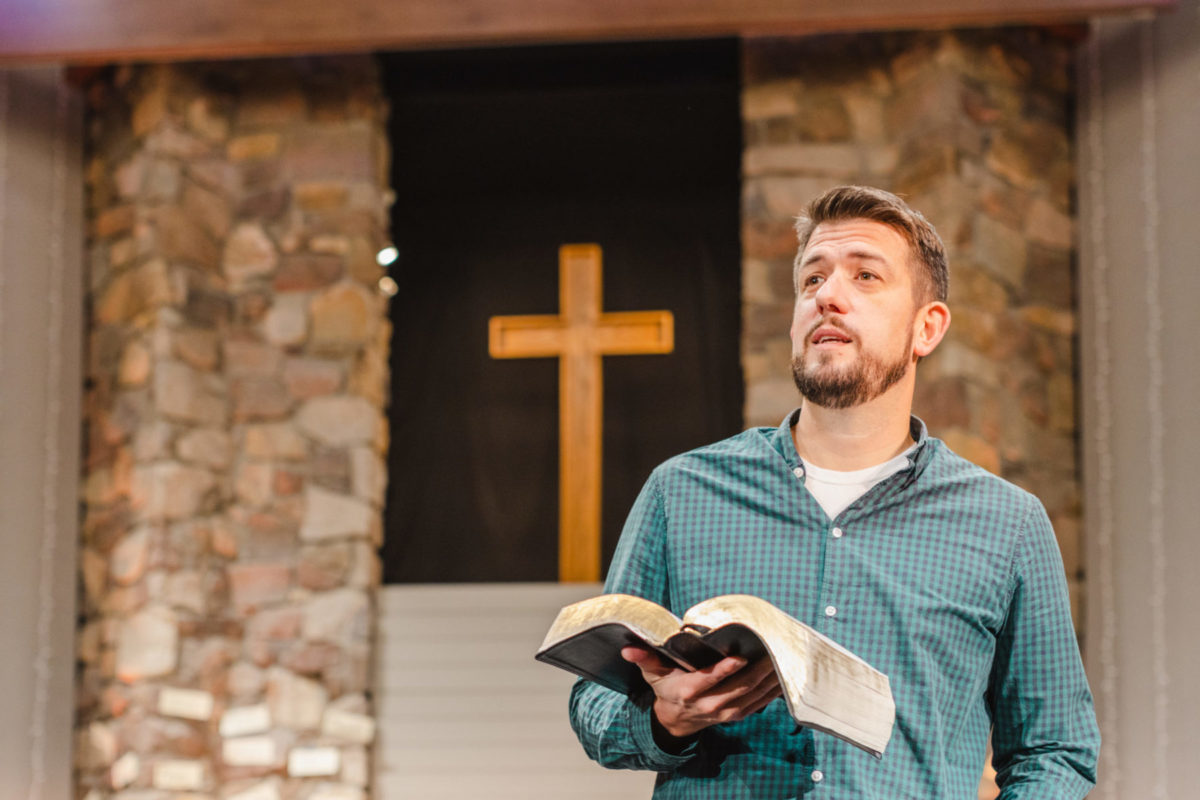May 13, 2022
I am Feeling a Call to Ministry… What are the Qualifications of a Pastor?
Written By Grace Theological Seminary
Tagged With Preaching & Pastoring Master of Divinity

Do you feel called to be a pastor? If so, then understanding the qualifications of a pastor is a great first step as you investigate how to respond to your calling. Although hundreds of great books have been written about pastoring, we will look exclusively to the Bible for answers.
First, know that your desire to pastor is a noble desire. Paul reminds Timothy of that in 1 Timothy 3:1, “The saying is trustworthy: If anyone aspires to the office of overseer, he desires a noble task.” Because of the great love Christ has for his Church, the responsibility to shepherd the church is also great. Your desire for pastoral ministry is indeed a noble calling.
As you begin to explore what it means to be called to be a pastor, a great place to start is to think about the qualifications of a pastor or ministry leader. There are two main passages in the Bible that set forth the qualification for “eldership” or “overseer.” Those are 1 Timothy 3 and Titus 1. Please take moment to review these passages:
- 1 Timothy 3:1-7 – “The saying is trustworthy: If anyone aspires to the office of overseer, he desires a noble task. 2 Therefore an overseer must be above reproach, the husband of one wife, sober-minded, self-controlled, respectable, hospitable, able to teach, 3 not a drunkard, not violent but gentle, not quarrelsome, not a lover of money. 4 He must manage his own household well, with all dignity keeping his children submissive, 5 for if someone does not know how to manage his own household, how will he care for God’s church? 6 He must not be a recent convert, or he may become puffed up with conceit and fall into the condemnation of the devil. 7 Moreover, he must be well thought of by outsiders, so that he may not fall into disgrace, into a snare of the devil.”
- Titus 1:5-9 – “ 5 This is why I left you in Crete, so that you might put what remained into order, and appoint elders in every town as I directed you— 6 if anyone is above reproach, the husband of one wife, and his children are believers and not open to the charge of debauchery or insubordination. 7 For an overseer, as God’s steward, must be above reproach. He must not be arrogant or quick-tempered or a drunkard or violent or greedy for gain, 8 but hospitable, a lover of good, self-controlled, upright, holy, and disciplined. 9 He must hold firm to the trustworthy word as taught, so that he may be able to give instruction in sound doctrine and also to rebuke those who contradict it.”
These passages are clear and do not require exhaustive interpretation. A good idea would be to combine these lists and reflect on what they mean. Remember, these qualifications are directly from God and we ought not to tamper with them.
Notice within these lists are some key indicators of the type and the nobility of the work: in Timothy, Paul says that the overseer “care[s] for God’s church”; and Titus mentions that an elder is “God’s steward.” The reason these qualifications matter is because God’s plan for His Church is at stake.
Having noted the qualifications of a pastor, one should familiarize themselves with the responsibilities of a pastor as well. Beyond the responsibilities inherent in the lists of qualifications, other passages give us the key responsibilities of a pastor.
1. Shepherd the church
- 1 Peter 5: 1-4 – “So I exhort the elders among you, as a fellow elder and a witness of the sufferings of Christ, as well as a partaker in the glory that is going to be revealed: 2 shepherd the flock of God that is among you, exercising oversight, not under compulsion, but willingly, as God would have you; not for shameful gain, but eagerly; 3 not domineering over those in your charge, but being examples to the flock. 4 And when the chief Shepherd appears, you will receive the unfading crown of glory.”
Here we see Peter’s main message is to “shepherd the flock of God that is among you, exercising oversight.” Shepherding is obviously a metaphor but it is one with which Bible students are familiar. When pastors shepherd, they care for, protect, and feed their congregations. This includes discipline, encouragement, rebuke, and exhortation from the Word of God. Additionally, they exercise oversight, that is, they lead their congregations. Finally, Peter mentions that elders are examples to the flock. It is not a stretch to say that as a pastor goes, so goes the congregation. This reminds us again of the qualifications of a pastor mentioned above. They are in place because your congregations will look to your example and will follow your leadership.
2. Equip the church by preaching and teaching
- Ephesians 4:12-14 – “To equip the saints for the work of ministry, for building up the body of Christ, until we all attain to the unity of the faith and of the knowledge of the Son of God, to mature manhood, to the measure of the stature of the fullness of Christ, so that we may no longer be children, tossed to and for by the waves and carried about by every wind of doctrine, by human cunning, by craftiness in deceitful schemes.”
- Titus 1:9 – “He must hold firm to the trustworthy word as taught, so that he may be able to give instruction in sound doctrine and also to rebuke those who contradict it.
- 2 Timothy 4: 1-2 – I charge you in the presence of God and of Christ Jesus, who is to judge the living and the dead, and by his appearing and his kingdom: preach the word; be ready in season and out of season; reprove, rebuke, and exhort, with complete patience and teaching.”
A pastor is charged to equip the saints for ministry and build up the body of Christ. The immediate context of Ephesians 4 talks about the gifts Christ gave to the church and two positional gifts Paul mentions are “shepherd and teachers.” When you combine this exhortation with Titus 1:9 and 2 Timothy 4:1-2, you see the importance of a pastor’s preaching and teaching ministry. Being an expert of the Bible and an expert communicator of the Bible are among the essential qualifications of a pastor.
3. Protect the church
- Acts 20:28-31 – ”Pay careful attention to yourselves and to all the flock, in which the Holy Spirit has made you overseers, to care for the church of God, which he obtained with his own blood. I know that after my departure fierce wolves will come in among you, not sparing the flock; and from among your own selves will arise men speaking twisted things, to draw away the disciples after them. Therefore be alert, remembering that for three years I did not cease night or day to admonish everyone with tears.”
The context suggests that Paul is speaking about protecting the church from false doctrines and those peddling “twisted things.” A pastor needs to be on alert for those who would cause dissension in the church and those who would lead astray by false teaching. This aspect of a pastor’s calling takes courage. In addition, it takes discipline to study and know sound doctrine so that the pastor can spot heresy. This is where a firm foundation in church history and systematic theology come in.
4. Lead the Church
Referring back to 1 Peter 5:2, pastors are told to “exercise oversight.” Additionally, in Titus 1:7, pastors are called “God’s stewards.” Also, in 1 Timothy 3, the charge is to “manage” the church. Finally, in 1 Peter 5:3 pastors are called to be an example to the flock.
All these references suggest that pastors are to lead the church. Pastors are to ‘break the trail’, or ‘pave the way,’ or whatever other metaphor you choose. There is some redundancy from point one above, but the emphasis here is on leading, while the emphasis on point one was shepherding. Pastors are looked up to, they are followed, and their example has a direct impact on the members of the congregation. That is why there is such a great emphasis on ‘character’ in the lists of qualifications. Pastors should expect to live in a glasshouse. They should expect themselves and their families to be on display. Living their lives as a godly example to the flock is non-negotiable.
5. Pray
- James 5:14 – “ Is anyone among you sick? Let him call for the elders of the church, and let them pray over him, anointing him with oil in the name of the Lord.”
This passage shows that one of the qualifications of a pastor is to pray for the sick in the church. When combined with the overall teaching of the Bible (Acts 2:42, 13:3, 20:36, etc.), prayer is a priority for pastors. In Acts 2:42, the apostles devoted themselves to prayer among other things. A pastor should be prepared to set aside time sufficient to pray for members of the church.
To be sure, the calling of a pastor is a high and noble calling. The bride of Christ, purchased by his precious blood is placed by God under their oversight. As stewards of God, pastors will answer directly to God for their stewardship. Peter promises that when the Chief Shepherd appears to relieve pastors of their duties, they will receive the unfading crown of glory.
At Grace Theological Seminary, we are dedicated to equipping those called to be a pastor. Our role is to teach, train and transform Christian leaders and launch them into effective ministry. Learn more about the Pastoral Studies program and how Grace can equip you to live up to the qualifications of a pastor.
Share
Tagged With Preaching & Pastoring Master of Divinity


